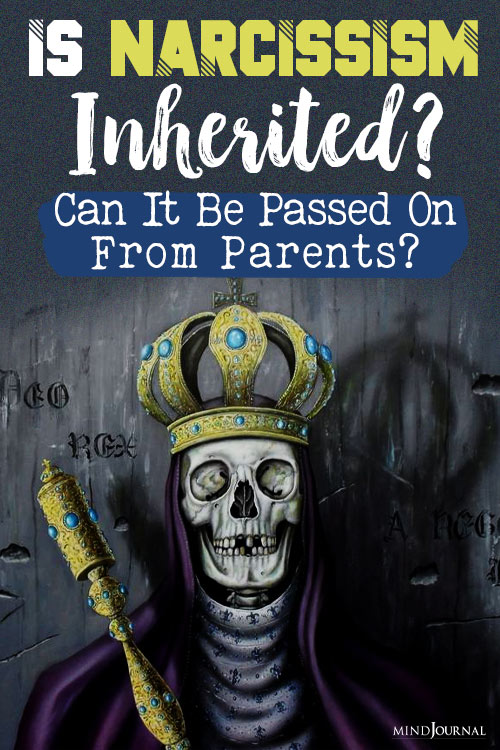Is narcissism inherited? Can children develop narcissistic personality disorder (NPD) from their parents? This is something I have personally wondered for years and have finally delved into the science behind the genetics of narcissism.
The curse of narcissism

There are certain things I am really good at, but not really proud of. Things like manipulating, lying, criticizing, breaking someone’s confidence, gaslighting, exploiting others, being vindictive and just plain destructive. Things I never wanted to be, but things I really excel at. Being an introvert, I have always wondered why I have these tendencies to manipulate people even though that is not what I truly want. Then I realized these traits – traits that I don’t really fully understand – I have inherited from my narcissistic mother. Narcissistic traits that have not only been passed on to me by my mother, but narcissistic behaviors that I have learned by growing around them.
So is narcissism inherited? Unfortunately, narcissism runs in families. Studies have found that narcissism can be passed on among family members and can be inherited.
Related reading: 7 Common Myths About Narcissistic Personality Disorder
Is narcissism hereditary?
Narcissistic personality disorder (NPD) is a personality disorder where the sufferer has an inflated sense of self-importance. Narcissists have a strong need for external validation, admiration and praise. They also lack empathy & compassion and often end up with toxic relationships. Although they may seem extremely confident, in reality they are full of self-doubt and are burdened with low self-esteem.
But is narcissism inherited? Yes. The unfortunate reality is that children can often inherit such traits from their parents or close relatives. Research indicates that although shared familial environmental effects have a strong influence on a child’s personality development, narcissism is an inheritable psychological condition. If someone in your family has a history of narcissism or any personality disorder, then it is likely that you may also develop narcissistic traits. In fact one study found that “the heritability appeared to be .79 for narcissistic” personality disorder.
Narcissistic personality disorder has a strong genetic predisposition that can lead to certain negative traits such as lack of emotion regulation, lower ability to cope with stress and high aggression. Studies claim that heritability of narcissism is about 77% in clinical sample and around “24% in the general population and there is no shared environmental influence or sex effect.”
Related reading: Are Narcissists Smarter Than Other People?

Is narcissism genetic?
Narcissistic traits are not always genetic. Then is narcissism a learned behavior?
When looking for the answer to the question “Is narcissism inherited?”, we also need to consider certain other factors as well. Researchers have found that narcissistic traits like entitlement and grandiosity are “moderately” heritable. “The two dimensions of narcissism, intrapersonal grandiosity and interpersonal entitlement, are heritable and largely independent of each other in terms of their genetic and environmental sources,” explain the researchers. However, one 2015 study reveals that narcissism can be instilled in children through attachment styles and parenting styles as well. “Narcissism in children is cultivated by parental overvaluation,” adds the study.
As narcissism is partially based on early socialization experiences, parents treating their children as entitled and special can unknowingly raise narcissistic children. However, when a parent expresses realistic expectations, appreciation and affection toward their children, then kids can develop healthy self-esteem.
Moreover, certain negative childhood and developmental experiences, such as early attachment style, childhood trauma, neglect, rejection & abandonment can also lead to a fragile ego and poor self-esteem, paving the way for narcissism in adulthood. On the other hand, overparenting, constant praise and believing your child is extraordinary can also lead to narcissism in children.
Related reading: The Anatomy of Narcissism
“Remembered childhood environments of being excessively pampered are associated with grandiose and vulnerable narcissistic traits, characterised by the young person expressing unrealistic self-views, entitlement beliefs and impaired autonomy,” states one 2020 study.
So is narcissism inherited? Yes, but childhood experiences also play a crucial role in the development of this personality disorder.
The genetics of narcissism
Personality disorders, like narcissism, are influenced by both genetic and environmental factors. It should be noted that narcissism is not directly related child abuse or poor parenting. According to a 2016 study, the genetic variants that determine the risk for developing narcissism and other personality disorders are “largely unknown.” The researchers claim that candidate genes typically involve the genes which control and manage neurotransmitters like norepinephrine, dopamine, serotonin etc.
These neurotransmitters are crucial for lack of empathy, impulsivity, mood regulation, aggression, suicidality and other common traits of personality disorders like narcissism. However, certain studies have found that the serotonin transporter gene (5-HTTLPR) is associated with the narcissism trait.
Related reading: What is Our True Nature? Are We Really Narcissists Only Out for Ourselves?

Narcissism is physical
If you are still wondering “is narcissism inherited?”, then there are some more things you need to consider.
Even though the narcissism gene is yet to be identified clearly, this personality trait has a significant biological basis. Some psychologists believe that someone can develop a narcissistic personality due to their physical appearance or physical attributes. Identified as reactive inheritance, it is believed that our personality is often influenced by our physical appearance. For instance, people who are physically smaller or weaker tend to be more timid and less confrontational than those who are taller and larger in appearance.
Some experts claim that physical traits and narcissistic traits are related as several researchers have found that narcissism is observed in people who are attractive, strong, healthy and athletic. “Narcissism is rooted in physical characteristics that, in turn, shape one’s psychological development,” explain the researchers. Although some experts claim that narcissism is unrelated to attractiveness, several others have observed a positive narcissism–attractiveness correlation.
In fact, narcissistic traits are found in women with sharp facial features and in men with sturdy jaws, large heads and thick eyebrows.
Related reading: Why You Should Stop Trying To Change The Malignant Narcissist
Narcissism is an instinctive trait
So, is narcissism inherited? According to a 2017 study, narcissism is considered as an instinct. It is regarded as a Mendelian trait, a form of biological inheritance, that can come from either parent. This instinct is associated with being obsessive and narcissistic. The researchers claim that the superego regulates narcissistic instincts and keeps them in control. However, when the superego is ineffective, the person will develop narcissistic personality disorder (NPD) after progressing through a few stages. This makes the individual incapable of reacting or responding “in sensible ways.” The study further adds “personality instincts are biologically-based Mendelian traits.”
The researchers state that narcissistic personality disorder has a genetic component and is the most commonly inherited personality type. They also believe that unless narcissistic instinct is inherited from either parent, one “has no potential to become narcissistic or develop NPD.” The study further states, “Narcissists present in all cultures in more or less the same way and have not changed for centuries. Why is that? The simple answer is that it is genetic.”
So the answer to your question – “is narcissism inherited?” – is a clear and definite yes. But does narcissism run in families for generations?
Related reading: Why Do Narcissists Lie So Much

Can narcissism be generational?
Yes, narcissism can be passed to children from parents, from one generation to another generation. This can be especially true if none of the family members seek treatment or therapy. Children will learn from and mimic the behaviors of their parents and elders in the household. As these children grow up, they will develop the same personality traits as their narcissistic parents. And as they build their own families, they will pass on the same narcissistic traits to their children and future generations.
Researchers from a 2011 study have found that every generation of younger individuals tend to have more intense narcissistic traits than their elders. “Every generation of young people is substantially more narcissistic than their elders, not because of cultural changes, but because of age-related developmental trends,” adds the study.
Related reading: The Difference Between Narcissism And Confidence
Narcissism runs in families
Whether narcissistic personality disorder is influenced by genetics or environmental factors, when you are raised by narcissistic parents, you are bound to grow up with trauma, low self-esteem and a distorted sense of self-worth. You may either become a shut-in and isolate yourself or you may become a narcissist yourself to cope with your childhood trauma and emotional pain.
It can be a rather disappointing and upsetting realization that narcissism can be inherited from parents, especially when you want to have a healthy relationship and life. But whether narcissism is nature or nurture, you can always overcome such toxic habits and change your personality by seeking therapy, employing self-help strategies and seeking support from loved ones.
You may have been born with narcissism, but you don’t have to live with it. Who you want to be is always up to you.
Related reading: 5 Ways You Can Win Against A Controlling Narcissist
Frequently Asked Questions (FAQs):
What does narcissism mean?
Narcissism refers to narcissistic personality disorder (NPD) where a person has excessive admiration for themselves and constantly seeks validation from others but lacks empathy.
What is malignant narcissism?
Malignant narcissism is a form of narcissism that results in intense narcissistic traits and aggression leading to abusive and exploitative behaviors.
What is grandiose narcissism?
Grandiose narcissism is marked by controlling and dominating behavior, an exaggerated sense of importance, a constant need for admiration, fantasies about power and success and a sense of entitlement.









